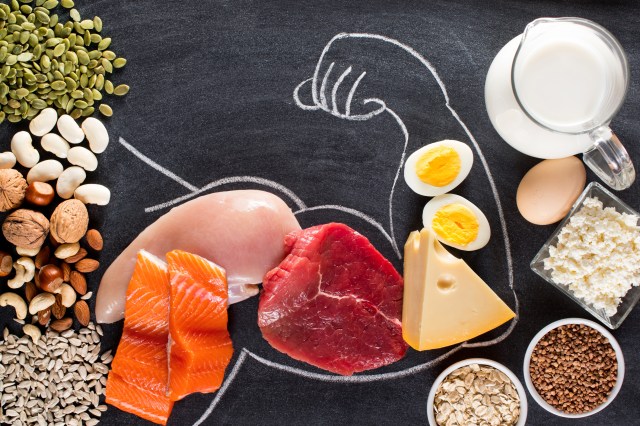
Protein may be the key to staying healthy and feeling great. Protein helps keep you fuller for longer, keeps your muscles strong and helps maintain muscle and build muscle and supports your overall health. Here’s why protein is essential and how you can include it in your daily meals and snacks:
Three Benefits of Protein
Protein promotes satiety and appetite control. Protein helps you feel full longer, reducing the likelihood of overeating. It also increases calorie burn, and you tend to eat less after a meal containing protein. This is particularly beneficial in a low-carb diet, where managing hunger is essential for maintaining energy levels and avoiding high-carb cravings.
Protein leads to muscle maintenance and growth. Protein is the building block of muscles and is a powerhouse for weight loss; eating optimal amounts of protein throughout the day can help maintain muscle mass, especially when losing weight. It also supports muscle repair and growth, helping you stay strong and active.
Protein improves your metabolic health. Regular protein intake has been shown to improve metabolic markers. A study published in BMC Nutrition found that daily consumption of 30 grams of milk protein concentrate for eight weeks significantly lowered body mass index, fasting blood sugar and insulin levels in obese women on a low-calorie diet.
Optimizing Protein = Big Results
Research shows we need about 0.4 grams of high-quality protein per pound of body weight. But you may need more protein than our current dietary guidelines recommend for enhanced weight loss and overall health, as well as to fuel your workouts and improve your body composition. Your goal isn’t just to survive on a minimal amount of protein but thrive with an optimal amount: Aim for 20 to 30 grams of protein per meal and approximately 10 to 15 grams per snack for best results. Spreading your protein intake like this helps stimulate muscle growth and manage your appetite.
Most high-quality protein sources also contain an important amino acid called leucine, which should be part of your daily protein intake. Leucine is crucial for muscle growth, recovery, weight control and blood sugar management. The best sources of leucine are typically animal proteins, but they can also be obtained through some plant-based foods.
Top Sources of Leucine
1. Whey Protein: An excellent source of leucine, whey protein is easily incorporated into smoothies and shakes for a quick protein boost.
2. Cottage Cheese: This versatile dairy product can be enjoyed alone or mixed with fruits and nuts.
3. Beef: Lean cuts of beef provide a substantial amount of protein and leucine, perfect for main meals.
4. Salmon: Rich in protein and healthy fats, salmon is great for heart health and muscle maintenance.
5. Eggs: A versatile and complete protein source, eggs can be cooked in numerous ways for any meal.
6. Nuts: Peanuts (which contain the most leucine of nuts), almonds, walnuts and other nuts are convenient snack options that provide protein and healthy fats.
7. Soy: Found in a variety of foods, such as tofu, soy milk and soy protein, is a good, plant-based source of leucine.
Incorporating Protein into Your Low Carb Diet
Balanced meals: Ensure each meal includes a significant protein source, whether animal-based or plant-based. Examples include grilled chicken salad, beef stir-fry with vegetables, a salmon fillet with a side of leafy greens or plant-based Mediterranean grilled tofu.
Protein-rich snacks: Protein-containing snacks may boost your calorie burn and reduce hunger. Choose snacks like Greek yogurt, hard-boiled eggs, Atkins protein bars or a handful of nuts to keep your protein intake consistent throughout the day.
Breakfast: Research shows that breakfast with high-quality protein starts your day off with a metabolic advantage. Consider eggs, smoothies or an Atkins PLUS protein and fiber shake for a convenient protein boost.
Meal prep: Prepare protein-rich meals and snacks in advance so you always have quality protein sources to avoid the temptation of high-carb convenience foods.
Making thoughtful choices about your protein sources and spreading out your daily intake will help you achieve your health and wellness goals.
The Deep Dive: More Research on Protein
Why a Diet Featuring Protein Can Give You Sustained Energy
